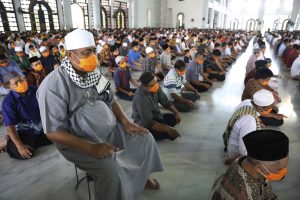After nearly three months in denial, Indonesian President Joko “Jokowi” Widodo finally took steps urging the public to embrace social distancing to delay the transmission of COVID-19. He can no longer dodge the media and public pressure after one of his ministers, Minister of Transportation Budi Karya Sumadi, tested positive for coronavirus.
Across Indonesia, 309 people have tested positive for coronavirus, and 25 people have died. But the number is potentially bigger considering the lack of health awareness among Indonesians.
We have seen a series of unscientific approaches, including public gaffes by several elites in the last two months. Indonesia’s Vice President Ma’ruf Amin and Minister of Health Agus Terawan argued the prayers from the public and clerics prevented the virus from spreading in the country. Similarly, the head of the National Disaster Management Authority (BNPB), Doni Monardo, argued Indonesians receive coronavirus immunity from their herb drinking habits.
Meanwhile, the government even allocated $4.8 million to boost the tourism sector to avoid a negative impact from the coronavirus outbreak. The initiative, designed to bring more foreign tourists into the country, was later postponed amid pressure from the public.
Indonesian desperately needs scientific facts to inform the steps taken by Jokowi’s administration in preventing the coronavirus outbreak. So far, the government’s main response has been to urge civil servants to work from home and the public to avoid public gatherings and visit designated hospitals. Jokowi has given local governments authority to take other necessary steps, but at the same time he also prohibited them from locking down their areas. It seems like there is a lack of coordination among the central and local governments.
It’s understandable that Jokowi is trying to prevent public panic and prioritize his economic development goals. But his administration’s nonchalant attitude may backfire. Without proper scientific countermeasures to prevent the escalation of coronavirus, it could potentially cost billions of dollars in taxpayer money. And there is no healthcare system in the world that has the capacity to tackle a huge escalation of patients like the one seen in Italy.
Even a country such as the U.K., with a mature healthcare system like NHS, cannot cope with a storm of patients. The surge will disrupt the supply chain of medicines and medical facilities such as beds and ventilators, which are crucial for coronavirus patients. Therefore, it is very important for governments to take serious mitigation measures to prevent the spread of the virus before a massive escalation of patients. In Indonesia in particular, it’s vital to reach regions that are vulnerable due to geographical challenges and lack of access to public health services, such as Maluku and Papua.
Avoiding these issues will cost lives. Despite the government efforts to tackle the coronavirus outbreak through fiscal policy by allocating $66.4 million to finance logistic needs, health facilities and infrastructure, health assistance, and laboratory costs, it will be hard to provide all the necessary medical tools, such as testing kits, simply because most countries need these same supplies. Even the United States, the richest country in the world, faced a shortage of raw materials needed to test for the virus. Qiagen, the Netherlands-based company that produces the “RNA-extracting” kits used to test for coronavirus, is back-ordered. There has been a massive escalation of demand and production cannot keep up.
Coronavirus is a serious challenge for the health system in Indonesia. The Social Security Administrator for Health (BPJS) will not cover the medical fee of coronavirus patients; instead, it will fall under the responsibility of the Ministry of Health based on a decree from the minister of health. Currently, the government has prepared 100 hospitals to face the coronavirus outbreak. But a lack of transparency and scientific explanations may put the public at risk. There is no information about the stage Indonesia is in right now, or when to expect the virus to reach its perk. All Indonesians know is that they have been advised to embrace social distancing but no one knows how long it will take – and what will follow.
The current response from Jakarta gives the worrying impression that the state is on autopilot.
The Indonesian government can no longer use the politics of denial. Avoiding the issue and limiting publicly available information could avoid political chaos, but cost thousands of lives — just like we saw in China. Indonesia could learn from Singapore, South Korea, and Thailand, all of whom minimized the transmission of disease by undertaking mass testing, contact tracing, and bans on public gatherings and unnecessary travel.
Dr. Asmiati Malik is an Assistant Professor at the Universitas Bakrie Indonesia, with a focus on political economy of Indonesia. She also a columnist at Kumparan.

































